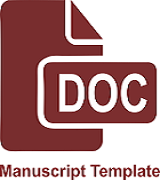KARAKTERISTIK KEMISKINAN DI KOTA BENGKULU TAHUN 2015 – 2019
Abstract
This study aims to analyze The Poverty Characteristic in Bengkulu City. We use descriptive qualitative method according mixing data from Central Bureau of Statistics (BPS) and The National Team for the Acceleration of Poverty Reduction (TNP2K). This study found that the percentage of poor people in the city of Bengkulu during 2015-2019 decreased, as well as the poverty depth index (P1) and the poverty severity index (P2). The poverty line shows an increasing trend and in 2019 it will be IDR 660,442 per capita per month. The Selebar sub-district has the largest distribution of the number of poor people in the city of Bengkulu is in. The largest number of children attending school in the poor population group in a wide district, and the number of children attending school is greater than those who do not. The number of people over 15 years of age who do not work is more than those who work. The largest housing ownership status is self-owned with the main source of lighting from PLN electricity.
Keywords
Full Text:
PDFReferences
Badan Pusat Statistik. 2020. Provinsi Bengkulu Dalam Angka.
Badan Pusat Statistik. 2020. Kota Bengkulu Dalam Angka.
Badan Pusat Statustik. 2020. Statistik Kesejahteraan Rakyat.
Banks. Lena Morgon. Hannah Kuper. and Sarah Polack. 2017. “Poverty and Disability in Low-And Middleincome Countries: A Systematic Review.” PLoS ONE 12(12):1–19.
Damrul Ahmad. Mike Triani. 2018. “Analisis Kausalitas Antara Kemiskinan. Ketimpangan Pendapatan Dan Tingkat Pendidikan Di Provinsi Sumatera Barat.” Jurnal EcoGen 1(3).
Islam. Rabiul. Ahmad Bashawir Abdul Ghani. Irwanshah Zainal Abidin. and Jeya Malar Rayaiappan. 2017. “Impact on Poverty and Income Inequality in Malaysia’s Economic Growth.” Problems and Perspectives in Management 15(1):55–62.
Kasiram. Mohammad. 2008. Metode Penelitian Kuantitatif-Kualitatif. Malang. Malang: UIN Malang Press.
Kuncoro. Mudrajad. 2004. Otonomi & Pembangunan Daerah. Reformasi. Perencanaan. Dtrategi. Dan Peluang. Jakarta: Erlangga.
Nazir. Moh. 2005. Metode Penelitian. Jakarta: Ghalia.
Nurwati. N. 2008. “Kemiskinan : Model Pengukuran. Permasalahan Dan Alternatif Kebijakan.” Jurnal Kependudukan Padjadjaran 10(1):245387.
Ogwumike. F. O. and M. K. Akinnibosun. 2013. “Determinants of Poverty among Farming Households in Nigeria.” Mediterranean Journal of Social Sciences 4(2):365–73.
Riduwan. 2004. Metode Riset. Jakarta: Rineka Cipta.
Rini. Ayu Setyo and Lilik Sugiharti. 2017. “Faktor-Faktor Penentu Kemiskinan Di Indonesia: Analisis Rumah Tangga.” Jurnal Ilmu Ekonomi Terapan 1(2):17–33.
Purta Nugraha Dian. 2020. K3miskinan di Kota Bengkulu, Apa Penyebabnya?. JIEP-Vol. 20, No 1, Maret 2020 ISSN (P) 1412-2200 E-ISSN 2548-1851
Sirojuzilam. 2008. Disparitas Ekonomi Dan Perencanaan Regional. Ketimpangan Ekonomi Wilayah Barat Dan Wilayah Timur Provinsi SumateraUtara. Pustaka Bangsa Press.
Spaho. Alma. 2014. “Determinants of Poverty in Albania.” Journal of Educational and Social Research (April 2014).
Sudjana. 2001. Metode & Teknik Pembelajaran Partisipatif. Bandung: Falah Production.
Supriatna. Tjahya. 1997. Birokrasi Pemberdayaan Dan Pengentasan Kemiskinan. Bandung: Humaniora Utama Press (HUP).
Todaro. Michael P. & Smith. Stephen C. 2003. Pembangunan Ekonomi Di Dunia Ketiga. Jakarta: Erlangga.
Todaro. Michael P. 2006. Pembangunan Ekonomi Di Dunia Ketiga. edited by Amminudin dan Drs. Mursid. Jakarta: Ghalia Indonesia.
TNP2K.2020. Tim Nasional Percepatan Penanggulangan Kemiskinan.
DOI: http://dx.doi.org/10.35448/jequ.v11i1.11275
Refbacks
- There are currently no refbacks.
Copyright (c) 2021 Jurnal Ekonomi-Qu

Phone: +62254 280330 ext 125







